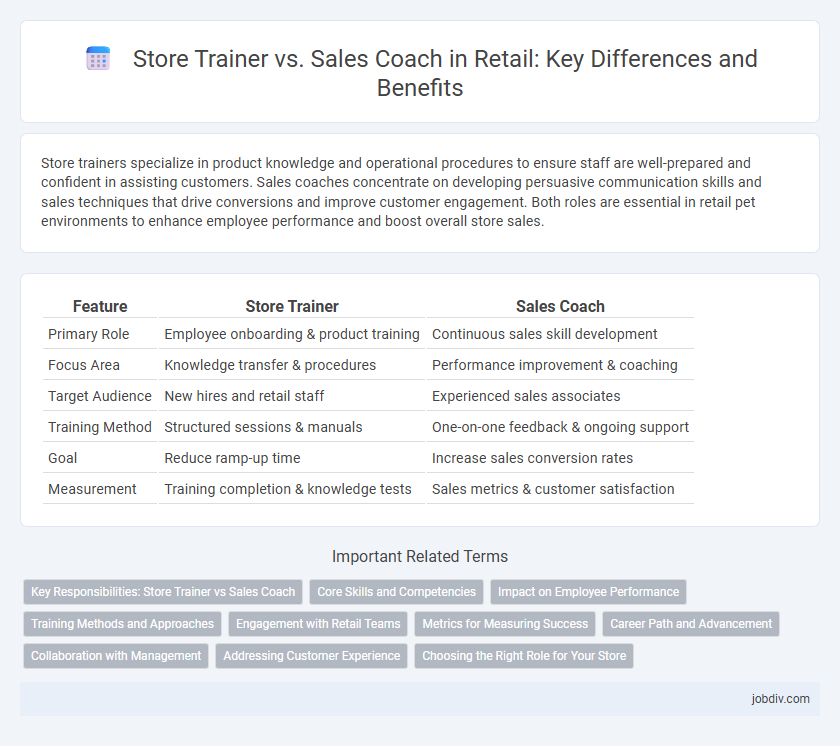Store trainers specialize in product knowledge and operational procedures to ensure staff are well-prepared and confident in assisting customers. Sales coaches concentrate on developing persuasive communication skills and sales techniques that drive conversions and improve customer engagement. Both roles are essential in retail pet environments to enhance employee performance and boost overall store sales.
Table of Comparison
| Feature | Store Trainer | Sales Coach |
|---|---|---|
| Primary Role | Employee onboarding & product training | Continuous sales skill development |
| Focus Area | Knowledge transfer & procedures | Performance improvement & coaching |
| Target Audience | New hires and retail staff | Experienced sales associates |
| Training Method | Structured sessions & manuals | One-on-one feedback & ongoing support |
| Goal | Reduce ramp-up time | Increase sales conversion rates |
| Measurement | Training completion & knowledge tests | Sales metrics & customer satisfaction |
Key Responsibilities: Store Trainer vs Sales Coach
Store Trainers are responsible for onboarding new employees, delivering standardized training programs, and ensuring compliance with company policies and product knowledge. Sales Coaches focus on enhancing individual sales performance through personalized feedback, development of selling techniques, and motivation strategies. Both roles aim to improve employee effectiveness but differ in scope, with Store Trainers emphasizing foundational skills and Sales Coaches targeting ongoing performance improvement.
Core Skills and Competencies
Store Trainers specialize in onboarding and foundational product knowledge, ensuring new employees quickly grasp essential retail operations and brand standards. Sales Coaches emphasize advanced interpersonal skills, customer engagement techniques, and performance optimization to drive sales growth and enhance team motivation. Both roles require strong communication, adaptability, and a deep understanding of retail dynamics to effectively elevate employee capabilities.
Impact on Employee Performance
Store Trainers develop foundational skills through structured onboarding and standardized training, ensuring employees understand core product knowledge and operational procedures. Sales Coaches enhance ongoing employee performance by providing personalized feedback, motivation, and advanced sales techniques tailored to individual strengths. The combined approach significantly improves employee productivity, customer engagement, and overall sales results in retail environments.
Training Methods and Approaches
Store trainers emphasize structured, standardized training methods focused on product knowledge, sales techniques, and operational procedures through formal sessions and e-learning modules. Sales coaches prioritize personalized, on-the-floor coaching techniques that foster skill development, real-time feedback, and behavioral change to improve individual and team performance. Both roles utilize interactive tools but vary in approach, with trainers delivering foundational content and coaches enhancing practical application.
Engagement with Retail Teams
Store trainers enhance retail team engagement by delivering structured product knowledge and operational skills, fostering consistent performance across locations. Sales coaches elevate team motivation through personalized feedback, goal-setting, and role-playing scenarios, driving continuous improvement and higher sales conversion rates. Combining both roles amplifies engagement, ensuring employees are both knowledgeable and inspired to exceed customer expectations.
Metrics for Measuring Success
Store trainers emphasize metrics like the number of employees trained, training completion rates, and knowledge retention scores to gauge effectiveness. Sales coaches prioritize performance indicators such as sales conversion rates, average transaction value, and customer satisfaction scores to measure their impact on revenue growth. Both roles use these key metrics to enhance team capabilities and drive overall store success.
Career Path and Advancement
Store Trainers specialize in onboarding and skill development, providing structured training programs that enhance employee performance and product knowledge. Sales Coaches concentrate on ongoing performance improvement, using personalized feedback and motivation to increase sales effectiveness and customer engagement. Career advancement for Store Trainers often leads to roles in corporate training or learning and development management, while Sales Coaches typically progress toward sales management or leadership positions within retail operations.
Collaboration with Management
Store trainers and sales coaches collaborate closely with management to align training programs with business objectives and sales targets. By sharing real-time feedback and performance data, they help management identify skill gaps and tailor development initiatives accordingly. This partnership drives consistent employee growth, enhances customer service quality, and boosts overall store performance.
Addressing Customer Experience
A Store Trainer focuses on teaching product knowledge and operational skills to enhance employee performance and ensure consistency in customer interactions. A Sales Coach emphasizes personalized feedback and motivation to improve sales techniques and build stronger customer relationships. Both roles are critical in addressing customer experience by combining foundational training with ongoing skill development to increase satisfaction and loyalty.
Choosing the Right Role for Your Store
Selecting the right role between a Store Trainer and a Sales Coach hinges on your store's specific needs: Store Trainers excel in onboarding and ensuring procedural compliance, while Sales Coaches focus on enhancing sales techniques and customer engagement. Evaluating factors such as team experience, sales performance, and training goals will guide the decision to prioritize foundational skill development or advanced sales strategies. Implementing the appropriate role aligned with your retail objectives boosts staff proficiency, drives sales growth, and improves overall customer satisfaction.
Store Trainer vs Sales Coach Infographic

 jobdiv.com
jobdiv.com